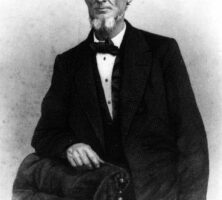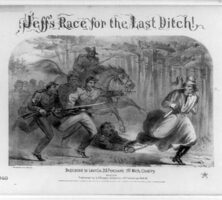In early May 1865 the Confederate States of America was greatly disorganized, largely because of the frenetic events of the previous month. General Robert E. Lee had surrendered the Confederate armies at the Appomattox Courthouse in Virginia, and most Americans believed the Civil War (1861-65) was over. The assassination of U.S. president Abraham Lincoln in Washington, D.C., by John Wilkes Booth and other sympathizers with the Southern cause, cast suspicion over many in the Confederate government. Though still intact, the government was largely ineffective.

Confederate president Jefferson Davis still retained hopes for the future of the Confederacy. Privately, he harbored a desire to reinforce the armies and move the fighting to the western part of the Confederacy. Publicly, he was forced to flee the Confederate capital in Richmond, Virginia, with a cadre of trusted advisors, which in effect became a government in exile. Upon departing Richmond, Davis and his retinue established a temporary center of government at Danville, Virginia. They soon moved farther south, however, because Virginia was heavily saturated with Union troops.
Among Davis’s advisors were John H. Reagan, Judah P. Benjamin, John Breckinridge, and Burton Harrison. A small but elite military escort was also in tow, and they all arrived in Washington, in Wilkes County, on May 3. The next day Davis held a final meeting with his cabinet, and the members dispersed after the president authorized their belated compensation from the remaining Confederate treasury, including gold. Davis proceeded south to Sandersville, where on May 6 he entrusted the remaining Confederate treasury to Captain Micajah Clark, the acting treasurer of the Confederacy, and on May 7 he was reunited with his wife, Varina, and their children. Together they moved on through Abbeville, in Wilcox County, on May 8, keenly aware that Union forces were close behind. The pursuit of Davis resulted largely from the U.S. War Department’s false assumption that he was complicit in the assassination of Lincoln. A $100,000 reward was promised for anyone who could bring in the president and his aides.

Reaching the farming community of Irwinville, in Irwin County, on the evening of May 9, the remaining hopefuls, still assuming that they were a step ahead of their pursuers, set up camp near a creek bed. Early the next morning the camp was awakened by a pop of gunfire and within minutes was surrounded by members of the First Wisconsin and Fourth Michigan cavalries. Not one shot was fired by the Confederates. Through some confusion Davis made a quick dash toward the creek. He had thrown his wife’s raglan, or overcoat, on his shoulders. This led to the persistent rumor that he attempted to flee in women’s clothes. A popular song of the era was “Jeff in Petticoats,” and the major tabloids featured artists’ renderings of the fallen leader dressed in everything from a wig to a hoop skirt. A zealous member of the Michigan detail quickly apprehended Davis, and he was transported to Fortress Monroe, Virginia, where he remained a prisoner for more than two years. His poor treatment and its subsequent exposure in the press helped strengthen the cause of Southern nationalism.

A historic marker indicates the spot where he was arrested, and the surrounding area is now the Jefferson Davis Memorial Historic Site, a thirteen-acre park that features a museum, hiking trail, and picnic facilities. Jeff Davis County, in central Georgia, is named in the Confederate president’s honor.








